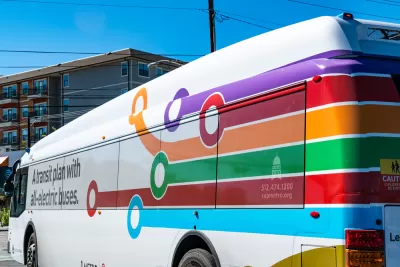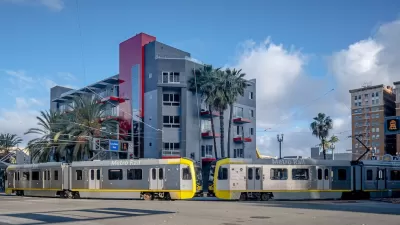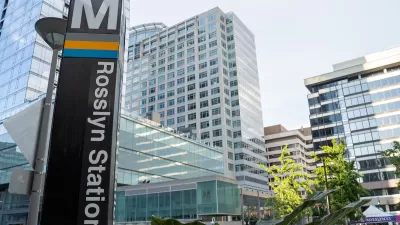City officials are deciding how to change parking requirements for transit-oriented developments that are meant to discourage private car ownership.

As the city of Austin finalizes its equitable transit-oriented development (eTOD) plan, some officials are urging their peers to change parking requirements near transit stations, reports Jonathan Lee in the Austin Monitor.
João Paulo Connolly, a member of the Project Connect Community Advisory Committee, “said that eliminating parking minimums is ‘an absolute baseline must,’” urging the city council to also adopt maximum parking requirements. “By making developers build as little parking as possible near transit stations, such policies would mean people are more likely to ditch their cars for trains or buses, Connolly and others argued.”
The eTOD plan proposes three ways to reform parking requirements: eliminating minimums, creating parking maximums, and including parking in floor area ratio (FAR) calculations. The change in FAR is the most controversial of the proposed changes. “According to city staffers, some stakeholders said the policy could prevent some projects from obtaining financing. In response, staffers recommend against adopting the policy.”
Other policies promoted by the eTOD plan include density bonuses, the preservation of existing affordable housing, and incentives to help small businesses open in TODs.
FULL STORY: Transit-oriented development plan prompts parking discussions

Alabama: Trump Terminates Settlements for Black Communities Harmed By Raw Sewage
Trump deemed the landmark civil rights agreement “illegal DEI and environmental justice policy.”

Study: Maui’s Plan to Convert Vacation Rentals to Long-Term Housing Could Cause Nearly $1 Billion Economic Loss
The plan would reduce visitor accommodation by 25% resulting in 1,900 jobs lost.

Why Should We Subsidize Public Transportation?
Many public transit agencies face financial stress due to rising costs, declining fare revenue, and declining subsidies. Transit advocates must provide a strong business case for increasing public transit funding.

Wind Energy on the Rise Despite Federal Policy Reversal
The Trump administration is revoking federal support for renewable energy, but demand for new projects continues unabated.

Passengers Flock to Caltrain After Electrification
The new electric trains are running faster and more reliably, leading to strong ridership growth on the Bay Area rail system.

Texas Churches Rally Behind ‘Yes in God’s Back Yard’ Legislation
Religious leaders want the state to reduce zoning regulations to streamline leasing church-owned land to housing developers.
Urban Design for Planners 1: Software Tools
This six-course series explores essential urban design concepts using open source software and equips planners with the tools they need to participate fully in the urban design process.
Planning for Universal Design
Learn the tools for implementing Universal Design in planning regulations.
Caltrans
Smith Gee Studio
Institute for Housing and Urban Development Studies (IHS)
City of Grandview
Harvard GSD Executive Education
Toledo-Lucas County Plan Commissions
Salt Lake City
NYU Wagner Graduate School of Public Service





























